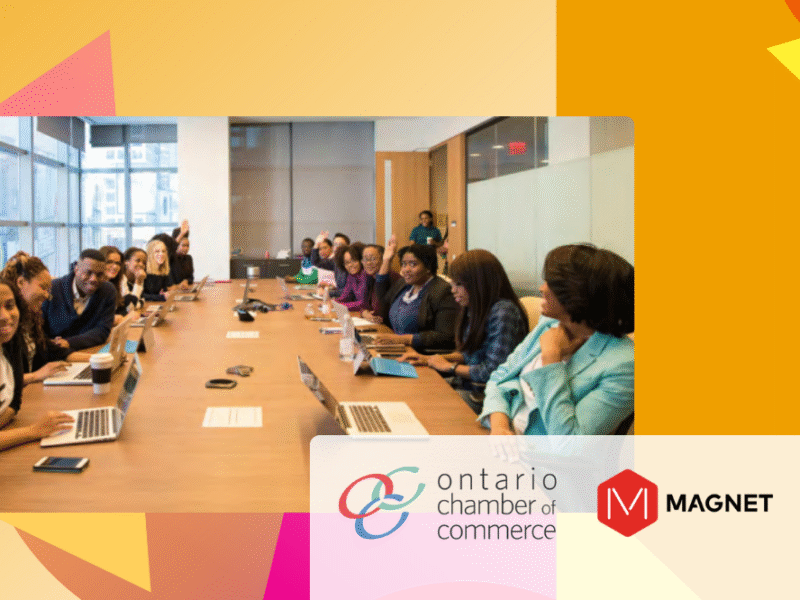Economic recovery requires a team effort across sectors and industries

For almost two years, Canadians have faced unprecedented economic challenges. The current hurdles are numerous: automation and new technologies have been introducing unprecedented levels of disruption to the workforce for several years, along with the magnification of social disadvantages and barriers to newcomer opportunities. These challenges preceded the pandemic, but the arrival of COVID-19 accelerated the changes, disrupting and eliminating the jobs of many Canadians.
Sobering statistics from analysts on Canada’s former Advisory Council on Economic Growth predicted even before the pandemic that the jobs of over 10 per cent of Canada’s workforce would be threatened by automation by 2030. Fast forward to today, and McKinsey predicts that 25 per cent more workers than previously estimated will need to switch occupations.
The pandemic exacted a terrible economic toll, and that toll was distributed unevenly. Sectors such as retail and hospitality were hard hit, but other areas saw growth. That uneven impact is known as a “K-shaped” recovery, meaning the highly skilled enjoy a return to pre-downturn employment conditions while others languish.
The report, Widening equality: Effects of the pandemic on jobs and income, notes that workers who earn lower incomes, are less securely employed, or have lower education levels, were much more adversely affected by COVID-19 and more likely to experience job loss or reduced work hours, compared to those with higher incomes. Also, many populations have been facing deep systemic barriers. Racialized communities, Indigenous peoples, older workers, LGBTQ2+ individuals, women, youth, and persons with disabilities have shouldered a disproportionately heavy load, with more precarious work conditions and a higher level of poverty.
New paths forward
Change can also bring opportunity. The pandemic has transformed some existing jobs and created new ones, promising new possibilities for the future. New opportunities can be found in transforming or expanding fields such as cybersecurity, a burgeoning part of the tech sector that is increasingly in demand. Artificial intelligence is another growth area within technology that is being adopted in more and more sectors, offering the promise of new and different jobs.
As the issue of climate change continues to dominate the public agenda, the call to focus on the green economy and more sustainable, carbon-neutral activities will only increase. New processes, systems and technologies that support the green economy are emerging, and these too will produce novel jobs and careers.
Moving out of the pandemic and paving a pathway to long-term prosperity, I believe that three principles will be key to the way forward: an emphasis on skills, an inclusive recovery, and a roadmap built on collaboration.
A focus on skills
Evolving sectors and jobs will require new and different skills, and therefore skills must be at the centre of any solution. New career possibilities offer us a chance to get better at ensuring that we invest in skilling up the workforce to meet the demands of the future.
We must also ensure that we upskill newcomers to Canada, faster, and in ways directly tied to labour market needs. Improving our approach will maximize people’s potential and give them better economic prospects.
Three principles will be key to the way forward: an emphasis on skills, an inclusive recovery, and a roadmap built on collaboration.Pedro Barata
An inclusive recovery
Efforts to advance an economic recovery must also be inclusive and tailored to the needs of vulnerable populations, who will increasingly face disruption and require other types of support. Child care, housing and other wraparound supports and services will be needed and must be relevant and accessible to disadvantaged and marginalized populations.
A roadmap built on collaboration
Cooperation is key. Partnerships among businesses, governments, academia, employers, community organizations and workers — moving out of their respective silos and together finding and investing in solutions that equip workers with the skills and supports — these steps are needed so people can thrive in new and emerging sectors.
Better connections will lead to improved outcomes. A new slate of employer-led sectoral partnerships that we recently launched is an excellent example of organizations working collaboratively with other players to innovate and chart new paths in some of the country’s most disrupted economic sectors. Our investment focuses on sectors that are either at high risk of automation or that will be key to Canada’s future success and integral to recovery.
If we keep the focus on inclusion, skills and collaboration, we can leave behind the damage of the pandemic and move into a future of shared prosperity in which no-one is left behind.
Pedro Barata is the executive director of the Future Skills Centre.
The views, thoughts and opinions expressed here are the author’s own and do not necessarily reflect the viewpoint, official policy or position of the Future Skills Centre or any of its staff members or consortium partners.




